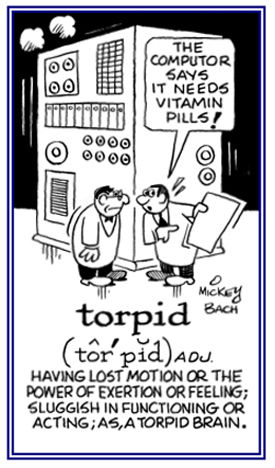torp-
(Latin: stupor, numb, sluggish)
2. An inactive condition resembling deep sleep, in which some animals living in hot climates; such as, how certain snails pass the summer: "Estivation or the cessation or slowing of activity protects these creatures against heat and dryness during their summer torpor."
3. The arrangement of petals in a flower before it opens; prefloration: "The tight bud or summer torpor of the roses is a sign that they are about to burst into full bloom."
"Her tepid personality was a guise for a brilliant mind."
The heat of the day made her feel very torpid; unfortunately, she was unable to gain any relief by swimming in the lake because the water was just too tepid.
2. Any of various submarine explosive devices; especially, a submarine mine: "The navy administration admitted to having an excess stock of torpedoes at the naval base."
3. A small explosive placed on a railroad track which is fired by the weight of the train to sound a warning to the engineer of an approaching hazard or danger ahead: "The train-track maintenance crew placed a small torpedo on the track to warn the engineer of the train to slow down at the bridge crossing."
4. An explosive fired in an oil or gas well to begin or to increase the flow the oil or gas: "The use of torpedoes in oil or gas fields requires significant safety planning."
5. A small firework consisting of gravel wrapped in tissue paper with a percussion cap that explodes when thrown against a hard surface: "The youth enjoyed throwing the torpedoes on to the hard pavement of the street during the holiday celebrations and watching them explode."
6. Etymology: from the 1520's, "electric ray", from Latin torpedo; originally, "numbness" (from the effect of being jolted by the ray's electric discharges), from torpere, "to be numb".
From New Latin Torpedo, a genus of fish which give electric shocks, which came from Latin torpedo, "stiffness, numbness, the torpedo" (fish), from torpere, "to be stiff".
The sense of "an explosive device used to blow up enemy ships" was first recorded in 1776, as a floating mine; the "self-propelled" version came from the 1860's.
2. To spoil, to undermine, to ruin, or to destroy something completely: "The union threatened to torpedo the agreement unless the company agreed to make retroactive pay increases."
"To explode a torpedo in an oil or gas well facilitates the extraction of such elements."
2. Growing numbness or inactivity and moving slowly in a very lethargic way: "Eve was overcome with torpescence during the hot and humid weather."
2. Deprived of the power of motion or feeling; drowsy or slow-moving; lethargic: Lying in a hammock under the shady tree sounds like a lovely torpid activity for a hot summer day.
3. Descriptive of a situation of biological rest or suspended activity; such as, animals in a dormant or hibernating condition: In winter, frogs, bears, and some other creatures go into a torpid state as they sleep through the cold season.
4. Etymology: from Latin torpidus, "benumbed"; from torpere, "to be stiff, to be numb".


Go to this Word A Day Revisited Index
so you can see more of Mickey Bach's cartoons.
"Another characteristic of torpidness is the existence of a mental ailment or some kind of physical inactivity or insensibility."
2. A state of mental or physical inactivity or insensibility: "Mike was experiencing significant torpor after working for two days without any sleep."
3. A situation in which an organism is inactive and it might be a result of damage to the nervous system or it might be a natural reaction to conserve energy: "Some mosquitoes pass the winter in a state of torpor so they can survive freezing temperatures."
2. An inactive condition resembling deep sleep in which certain animals living in cold climates pass the winter: "In hibernation, the body temperature is lowered and breathing and heart rates slow down. Winter torpor protects certain animals from cold and reduces the need for food during the season when food is scarce or unavailable."
